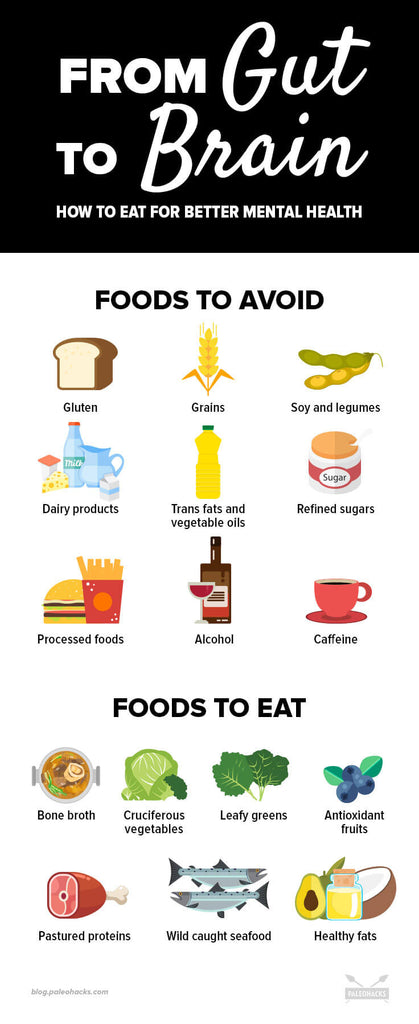Is This The Reason You're Feeling So Anxious?
By Chrissy Callahan
What do your gut and people who never text back have in common? They’re both affecting your mental health.
When it comes to taking care of your mental health, maintaining a healthy gut is key. It might sound counterintuitive, but the mind-body connection is more powerful than most of us realize, and mental health issues such as depression and anxiety can originate in the gut or result from a poorly-maintained gut.
The gut and the brain are in constant communication
"Mental health and gut health are closely related through the gut-brain axis, a bi-directional communication pathway that includes the vagus nerve, the chemical messenger serotonin, and several other hormones, nerve cells, and even bacteria. In fact, the gut is often referred to as the ‘second brain,’ American Gastroenterological Association expert Laurie Keefer, PhD., said.
The gut-brain axis is a two-way street, with a constant exchange of messages that make both systems run properly. Case in point? The gastrointestinal tract creates neurotransmitters (chemical messengers) such as acetylcholine, dopamine, and serotonin, which the brain depends on to make us feel good. Trust us, you need those. Then there's the vagus nerve, which transmits feel-good signals from the gut to the brain. Without a proper back-and-forth exchange, it becomes increasingly difficult to sustain mental health.
Ash Center
 "The gut responds to the brain and vice versa. The best-known example here is stress and the vicious cycle it perpetuates," Dr. Anthony Lyons MD, Integrated Medicine and Musculoskeletal Doctor at
The Ash Center for Comprehensive Medicine
, explained. “Stress results in the body being in a constant state of fear and agitation. These chemicals and hormones speed everything up, making proper digestion nearly impossible, while tearing at the gut’s fragile and essential lining." The result? Bloating, indigestion, reflux, gas, and irregular bowel movements. No thanks! Over time, this creates an imbalance in the gastrointestinal tract as our nervous and immune systems stop communicating properly. “Without proper gut function, it’s difficult to sustain mental health,” Lyons said.
"The gut responds to the brain and vice versa. The best-known example here is stress and the vicious cycle it perpetuates," Dr. Anthony Lyons MD, Integrated Medicine and Musculoskeletal Doctor at
The Ash Center for Comprehensive Medicine
, explained. “Stress results in the body being in a constant state of fear and agitation. These chemicals and hormones speed everything up, making proper digestion nearly impossible, while tearing at the gut’s fragile and essential lining." The result? Bloating, indigestion, reflux, gas, and irregular bowel movements. No thanks! Over time, this creates an imbalance in the gastrointestinal tract as our nervous and immune systems stop communicating properly. “Without proper gut function, it’s difficult to sustain mental health,” Lyons said.
Essentially, when communication between your gut and brain is altered, mental health issues such as anxiety and depression can more easily materialize. Inflammation in the gut can also often lead to changes of behavior in the brain, which can mimic depression.
"There’s a direct connection between mental health and gut health, and as gut health overall has suffered in modern times, it either exacerbates and perpetuates existing depression and anxiety, or helps create it," Lyons said.
Typically, we think gut issues such as an upset stomach are a result of mental distress (like stress at work or our favorite character being killed off on Game of Thrones), but the connection is more complicated. “Gut symptoms also drive mental health issues — being stuck in the bathroom and unable to commit to plans leads to depression, chronic abdominal pain is linked to depression and suicidal ideation. Unpredictability of gastrointestinal symptoms can foster worry, anxiety, and obsessive rituals,” Keefer explained.
Other mental health issues caused by brain-gut connection
Anxiety and depression are just two of the mental health issues that can originate in the gut; Attention Deficit Hyperactivity Disorder (ADHD) and insomnia are also tied to the brain-gut connection.
“Manifestations of ADHD have been drastically reduced by improving gut health through the elimination of certain foods and environmental triggers. Getting people to sleep well also depends on healthy gut function,” Lyons explained.
In fact, anxiety and depression can be influenced by a poor sleep schedule. “For those contending with anxiety and depression, it’s challenging to achieve a sense of well-being unless they’re sleeping. In order to sleep well, we depend on the production of GABA, which will again be challenging to make without a healthy gastrointestinal tract,” Lyons revealed.
Your diet plays an important role in maintaining a balanced gut, and any sudden changes can threaten the stability of your gut’s microbiome (or, the term used to refer to your gut’s microbes and bacteria). “Bacteria in the gut is highly influenced by diet, and one’s microbiome can often change in a very short period of time when following a diet,” Keefer said.
Image from PaleoHacks
So what can you do to ensure a healthy brain-gut connection?
It sounds cliché, but following a healthy diet is the first step since any toxins in the food we consume can put our immune system on heightened alert. Getting regular sleep and physical activity also helps.
One unexpected method? Proper breathing. Most of us take deep breaths by bowing out our chest, lifting our shoulders and breathing in vertically. However, Lyons said this method creates a sense of fear and unrest, telling our brain that we’re in “fight-or-flight” mode. “Instead, expand your abdomen when you inhale and make it look like a pregnant belly, which engages your diaphragm, and dissipates turmoil by telling your vagus nerve that all is fine and it’s okay to rest, relax, and digest,” he said.
If you’re experiencing the negative effects of an imbalanced brain-gut connection already, early treatment can prevent progression. Supplements such as glutamine and aloe can also heal the gastrointestinal tract, while probiotics can introduce good bacteria, and oregano oil can wipe out bad bacteria.
















